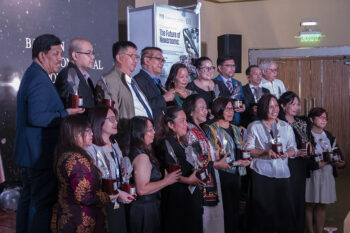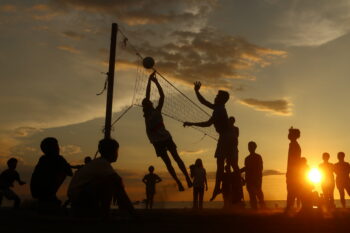by Maki T. Datu-Ramos II
“Political freedom means the absence of coercion of a man by his fellow men. The fundamental threat to freedom is power to coerce, be it in the hands of a monarch, a dictator, an oligarchy, or a momentary majority. The preservation of freedom requires the elimination of such concentration of power to the fullest possible extent and the dispersal and distribution of whatever power cannot be eliminated — a system of checks and balances.” – MILTON FRIEDMAN, 1976 Nobel Prize Winner in Economics
QUEZON CITY (MindaNews/23 January) — Electing leaders of the country starts with the filing of certificates of candidacy. And we have heard of hopeful Moro senatorial candidates whom we, of course, want to win to represent the Bangsamoro but also to give Filipinos more qualified and competent leaders to choose from.
However, some aspirants who filed have very minimal national appearances or exposure in the media. They are our very own kababayan and kadugo: Administration Liberal Party candidate Bai Nariman Ambolodto of Maguindanao, Princess Jacel Kiram of Sulu and Norodin Alonto Lucman of Lanao del Sur. Other senatorial candidates are not well known as they are neither heard nor seen on the national stage.
Since the 1987 Constitution was ratified, Senators Mamintal Tamano and Santanina Rasul were the only Moro elected to the Senate. The latter served for two terms, under the Aquino administration from 1987 to 1992 and reelected under the Ramos administration from 1992 to 1995.
For two decades now, there has been no Moro voice in the Senate. Not one Moro candidate was elected in the seven national elections since Rasul vacated her post: 1995, 1998, 2001, 2004, 2007, 2010, and 2013.
Can a Moro take a seat again in the halls of Senate?
I don’t want to sound cynical but my doubt is backed up by simple facts and history, which led me to sadly conclude that a senatorial candidate from the Bangsamoro is like Don Quixote dreaming an impossible dream.
For a senatorial candidate to get an 11th or 12th seat, one must garner a total vote of 13 or 14 million in the entire country. ARMM or the Bangsamoro votes, even if everyone unites as a block vote, can only promise 1.5 to 2 million votes to support a fellow Bangsamoro. But the big question is how can one get an additional 10 or more million votes to secure a seat in the Senate?
Statistics reveals much. Let’s look back at the most recent elections. In 2007 senatorial election, the only Moro candidate was Sultan Jamalul Kiram III who ran under Team Unity and PDSP. The lone Moro among Arroyo’s 12 candidates in 2007, Kiram landed 12th in Maguindanao. Despite the all-out support of the Macapagal Administration, he garnered only 2.4 million votes, or 26th in the Senate poll.
Aquilino “Koko” Pimentel III, a Mindanawon bar topnotcher and a son of a very popular national leader, Aquilino “Nene” Pimentel, Jr. almost did not make it to the 12th slot as he got only 11 million votes after the highly controversial complaint that had Pimentel filing a protest that he was cheated at the polls by fellow Mindanawon Migs Zubiri.
In 2010 election, Atty. Adel Tamano (Nacionalista Party), Yasmin Lao (Liberal Party) and Zafrullah Alonto (Bangon Pilipinas) all from Lanao del Sur, ran for the Senate but placed 23rd, 32nd and 45th with votes of 4 million, 2 million and 700,000, respectively. The 12th place went to another Mindanawon, Teofisto Guingona III, son of a famous former senator and Vice President Teofisto Guingona Sr.
In my own knowledge, no Moro attempted to join the 2013 Senate fray for it would just be a political exercise in futility. My basic electoral analysis would lead us to believe that it takes one to be a son of a very famous national and political leader, or a daughter of a famous actor to make it to the Top 12 of Senate seats due to name recall like Estrada, Poe and Binay.
But having a political machinery, money, popularity or credentials, however, does not ensure the candidate a seat in the Senate. A perfect example is Jack Enrile, who even with his father’s wealth and connections, lost in the polls as did Jamby Madrigal. Risa Hontiveros is another candidate who, with her credentials and media mileage in various issues, lost twice in past elections though she will be running again in the 2016 elections. Teddy Casino, a populist leader and famous face in TV did not also win. The good track records and impressive performances respectively of Dick Gordon and Jun Magsaysay were not enough to get them reelected as well.
It is in history that we can find hope for not only were Moro elected in the past but they exemplify the best of the best this country ever had. Salipada Pendatun of Cotabato was Senator from 1946-1951 and re-elected 1969-1972. Congressman Ahmad Domocao Alonto was Senator for 1955 to 1961.
Atty. Mamintal Tamano was Senator from 1969-1971 during the Marcos administration and also during the Aquino Administration from1987-1992. As mentioned earlier, Senator Santanina Rasul was elected in 1987 and reelected in 1992 However, it should be pointed out that Tamano and Rasul were lucky to win in 1987: they ran during the post-EDSA revolution under the famous party of the Cory Aquino’s Laban against the pro- Marcos KBL (Kilusang Bagong Lipunan) party and both vied for the 24 Senatorial seats.
But during the American commonwealth era, Senate positions for the Moro were actually appointed. The reason obviously was that the Americans knew that the there were minorities in the country like the Moros who definitely cannot compete electorally against the majority and more educated Filipinos of Luzon and Visayas.
Hadji Butu of Sulu was an American-appointed governor of Mindanao and Sulu in 1904 until he was appointed Governor of the Sulu district upon partition of Mindanao and the islands. He was appointed 12th district Senator comprising and representing the Twelfth Senatorial District of Mt. Province, Nueva Vizcaya, Agusan, Bukidnon, Cotabato, Davao, Lanao, Sulu, Zamboanga (or for the Department of Mindanao and Sulu and Baguio as its capital district city were considered Non-Muslim and Tribal Areas during the American occupation).
Hadji Butu was the longest-serving Moro Senator from 1916-1919; 1922-1925; 1925-1928, and 1928-1931. Sultan Jamalul Kiram of Sulu was also appointed Senator of the 12th district from 1931-1934. He served in the Senatorial districts of the Philippines representing the respective provinces in the occupied country from 1916 to 1935. A total of 12 districts comprised all the provinces and cities in the country then.
Datu Sinsuat of Cotabato was appointed district senator in 1934 in the 10th Philippine legislature. Sultan Alauya Alonto of Lanao del Sur was the first Moro among 24 elected (all from Nacionalista party) from 1941-1947. However, the elected officials did not serve their terms from 1942 to 1945 due to Japanese occupation and World War II. After the end of war and the re-establishment of Commonwealth government, senators were able to actually fulfill their function only during Commonwealth Congress which was able to convene mainly from July 9, 1945 until May 23, 1946.
From these facts, only Senators Alonto, Pendatun, Rasul and Tamano, who lived in less politically corrupt times, were elected and chosen in an at-large voting process in the country. The rest of the Moro senators were appointed. And for the future 2016 result, we will be waiting hopefully, or hopelessly, for a Bangsamoro face and voice in the Senate. We are wishing though that voters will be more mature and learn to choose candidates based on platforms and programs or track records this coming election.
Grim political culture like moneyed patronage and media popularity may be blamed for impossibility of electing a Moro senator.
For democracy to function healthily, maturity of institutions and voters in general is needed. Anyone can hope, for hope is eternal but we must be also be politically realistic because the political system or structure may be wrong or defective itself. It is long overdue to do justice to have a fair and just, if not equal, distribution of representation as far as the Senate is concerned.
Maybe changing the Constitution itself to accommodate a federal set up or a regional senate may finally give justice to the Moro people who aspire to serve the country oat the national level.
Truth hurts. History teaches lessons. But truth and history must give us right directions, viable options and working alternatives. And we should never be content with just being national candidates who lose in every election. We must free ourselves from being captive to an unjust political system.
(Maki T. Datu-Ramos II, a graduate of AB History from the University of the Philippines in Diliman, Quezon City, was a former Public Attorney who is now a private practitioner. A Meranao from Lanao del Sur, he is an advocate of peace and federalism. He worked as a legal consultant of one of the commissioners of the Bangsamoro Transition Commission that drafted the Bangsamoro Basic Law and writes also for the new publication, Bangsamoro Crescent.)







